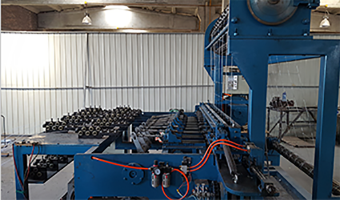-
Email:zhao@hyliec.cn
-
Tel:+86 311 85273988
-
WhatsAPP:8613931128750
-
 Afrikaans
Afrikaans -
 Albanian
Albanian -
 Amharic
Amharic -
 Arabic
Arabic -
 Armenian
Armenian -
 Azerbaijani
Azerbaijani -
 Basque
Basque -
 Belarusian
Belarusian -
 Bengali
Bengali -
 Bosnian
Bosnian -
 Bulgarian
Bulgarian -
 Catalan
Catalan -
 Cebuano
Cebuano -
 Corsican
Corsican -
 Croatian
Croatian -
 Czech
Czech -
 Danish
Danish -
 Dutch
Dutch -
 English
English -
 Esperanto
Esperanto -
 Estonian
Estonian -
 Finnish
Finnish -
 French
French -
 Frisian
Frisian -
 Galician
Galician -
 Georgian
Georgian -
 German
German -
 Greek
Greek -
 Gujarati
Gujarati -
 Haitian Creole
Haitian Creole -
 hausa
hausa -
 hawaiian
hawaiian -
 Hebrew
Hebrew -
 Hindi
Hindi -
 Miao
Miao -
 Hungarian
Hungarian -
 Icelandic
Icelandic -
 igbo
igbo -
 Indonesian
Indonesian -
 irish
irish -
 Italian
Italian -
 Japanese
Japanese -
 Javanese
Javanese -
 Kannada
Kannada -
 kazakh
kazakh -
 Khmer
Khmer -
 Rwandese
Rwandese -
 Korean
Korean -
 Kurdish
Kurdish -
 Kyrgyz
Kyrgyz -
 Lao
Lao -
 Latin
Latin -
 Latvian
Latvian -
 Lithuanian
Lithuanian -
 Luxembourgish
Luxembourgish -
 Macedonian
Macedonian -
 Malgashi
Malgashi -
 Malay
Malay -
 Malayalam
Malayalam -
 Maltese
Maltese -
 Maori
Maori -
 Marathi
Marathi -
 Mongolian
Mongolian -
 Myanmar
Myanmar -
 Nepali
Nepali -
 Norwegian
Norwegian -
 Norwegian
Norwegian -
 Occitan
Occitan -
 Pashto
Pashto -
 Persian
Persian -
 Polish
Polish -
 Portuguese
Portuguese -
 Punjabi
Punjabi -
 Romanian
Romanian -
 Russian
Russian -
 Samoan
Samoan -
 Scottish Gaelic
Scottish Gaelic -
 Serbian
Serbian -
 Sesotho
Sesotho -
 Shona
Shona -
 Sindhi
Sindhi -
 Sinhala
Sinhala -
 Slovak
Slovak -
 Slovenian
Slovenian -
 Somali
Somali -
 Spanish
Spanish -
 Sundanese
Sundanese -
 Swahili
Swahili -
 Swedish
Swedish -
 Tagalog
Tagalog -
 Tajik
Tajik -
 Tamil
Tamil -
 Tatar
Tatar -
 Telugu
Telugu -
 Thai
Thai -
 Turkish
Turkish -
 Turkmen
Turkmen -
 Ukrainian
Ukrainian -
 Urdu
Urdu -
 Uighur
Uighur -
 Uzbek
Uzbek -
 Vietnamese
Vietnamese -
 Welsh
Welsh -
 Bantu
Bantu -
 Yiddish
Yiddish -
 Yoruba
Yoruba -
 Zulu
Zulu
farm fence installation cost
Understanding Farm Fence Installation Costs
Installing a fence around your farm can be a crucial investment for both the protection of your livestock and the security of your property. However, before embarking on such a project, it is vital to understand the various factors influencing the overall costs of farm fence installation. This article will break down these costs and offer insight into making an informed decision.
Types of Fencing Materials
One of the primary determinants of your fencing cost is the type of material you choose. There are several options available, each with its pros and cons
1. Barbed Wire This is often the most affordable option, making it a popular choice for large farms with extensive perimeters. However, it may not provide sufficient protection against predators or keep smaller animals contained.
2. Wood Fencing Though more aesthetically pleasing, wooden fences can be quite expensive. They require regular maintenance and may need to be replaced after several years, thus increasing overall costs in the long run.
3. Vinyl Fencing This material is low maintenance, but the initial installation cost can be significantly higher than wood or wire options. However, its durability can make it a cost-effective choice over time.
4. Electric Fencing While generally less expensive to install than traditional fencing, electric fences require a power source and regular maintenance to ensure their effectiveness.
5. Composite Fencing This relatively newer material combines wood and plastic, offering durability and low maintenance. However, it also comes with a higher price tag.
Labor Costs
In addition to material costs, labor expenses play a significant role in the overall cost of fence installation. Hiring a professional installer can range anywhere from $30 to $80 per hour, depending on the complexity of the job and regional labor rates. The total labor cost can also increase if special machinery is required for installation or if the terrain is particularly challenging.
farm fence installation cost

Property Size and Terrain
The size of your farm and the type of terrain will massively impact the total cost. A larger area will naturally require more materials and labor, driving up expenses. Additionally, if your farm is located in a hilly or rocky area, extra work may be needed to prepare the land for fencing, further increasing costs.
Permits and Regulations
In some areas, fencing installation may require permits, especially if you plan to build a high fence or if the fence is to be built near property lines. It's essential to check with local regulations to ensure compliance. Costs associated with permits can add an unforeseen expense to your installation budget.
Additional Features
You might want to consider additional features such as gates, decorative elements, or specific security enhancements. Each of these can significantly increase the overall costs. Gates, particularly, can be a major expense depending on their size and material.
Maintenance and Longevity
Lastly, it is crucial to consider the long-term maintenance costs when evaluating your fencing options. For example, while barbed wire might be cheap initially, it may require more frequent replacements or repairs than a more durable option like vinyl.
Conclusion
In conclusion, determining the cost of farm fence installation involves a variety of factors, including the type of material, labor costs, property size, local regulations, and additional features. By carefully assessing these aspects and selecting the right combination for your specific needs, you can make a well-informed decision that will serve your farm effectively for years to come. Remember, investing in a quality fence not only protects your livestock and property but can also enhance the overall value of your farm.
-
Secure Your Space with Double Wire Mesh Fences
NewsJun.20,2025
-
Modern and Stylish 3D Fencing Solutions
NewsJun.20,2025
-
Enhance Your Garden with Beautiful Border Fences
NewsJun.20,2025
-
Enhance Security with High-Quality Fencing Solutions
NewsJun.20,2025
-
Elevate Your Space with Elegant Fencing Solutions
NewsJun.20,2025
-
Durable and Secure Fencing Solutions
NewsJun.20,2025
